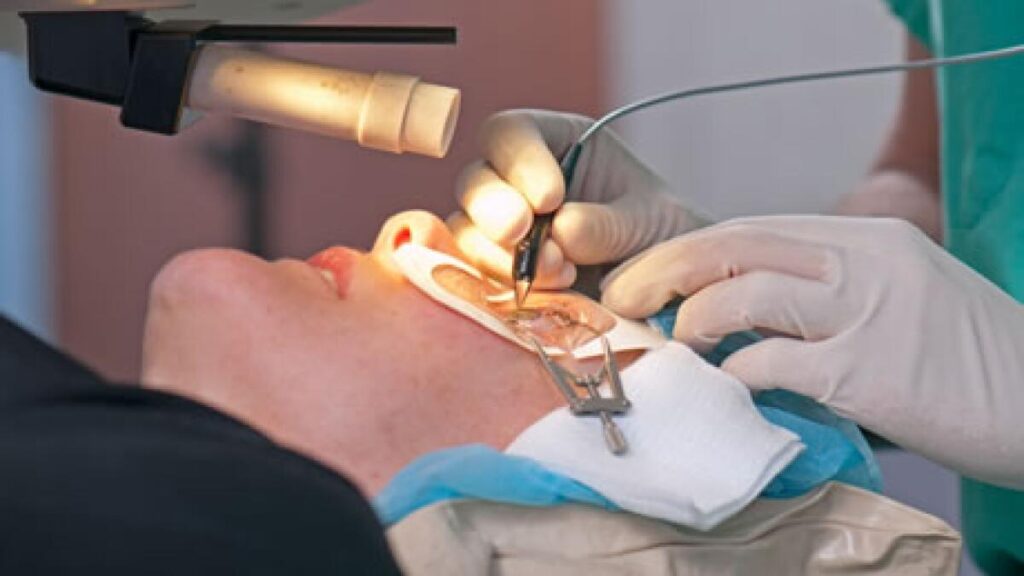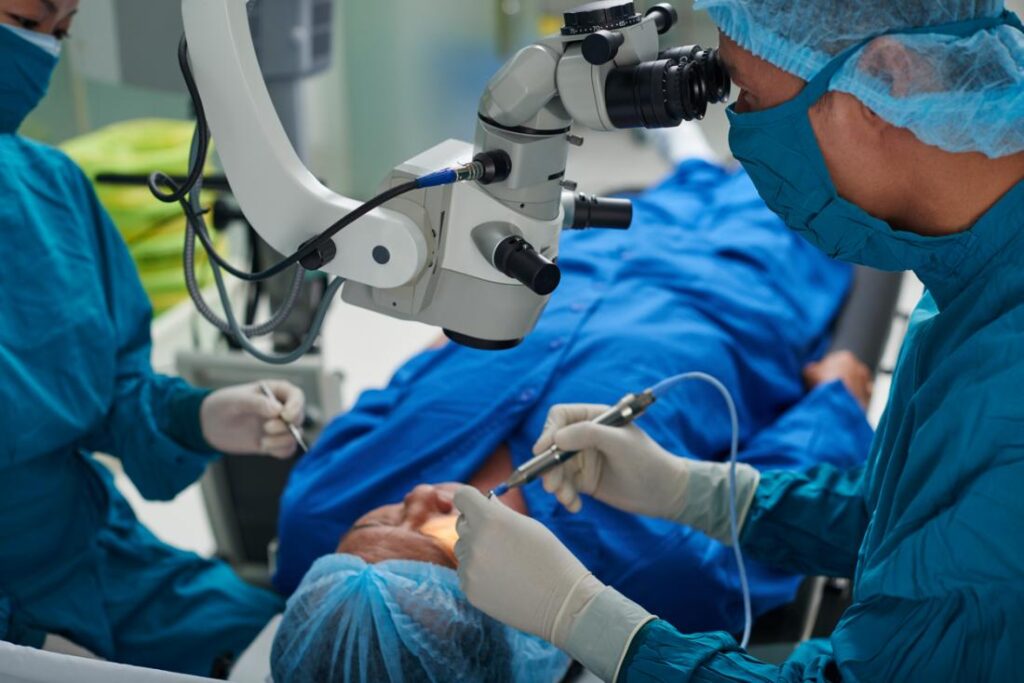In recent years, LASIK surgery has become an increasingly popular choice for those looking to improve their vision and say goodbye to glasses or contact lenses. If you are considering this procedure, it is essential to understand the benefits and process of LASIK. With our team of experts, we will guide you through the journey of LASIK surgery, from understanding the procedure to post-surgery care and recovery.
Understanding LASIK Surgery: An Overview
Before diving into the specifics, let’s start with the basics. What exactly is LASIK eye surgery? LASIK, which stands for “laser-assisted in situ keratomileusis,” is a refractive surgery that corrects common vision problems such as nearsightedness, farsightedness, and astigmatism. It works by reshaping the cornea, the clear front part of the eye, to improve the way light is focused onto the retina, resulting in clearer vision.
But how does LASIK actually reshape the cornea? During the procedure, a thin flap is created on the cornea using a microkeratome or femtosecond laser. This flap is then lifted, exposing the underlying corneal tissue. The excimer laser, a cool ultraviolet beam, is then used to precisely remove a small amount of corneal tissue, reshaping it according to the patient’s unique prescription. Once the cornea is reshaped, the flap is carefully repositioned, acting as a natural bandage that promotes healing.
So, who is an ideal candidate for LASIK? While the best way to determine eligibility is through a comprehensive evaluation with our experts, generally, suitable candidates are adults with stable vision prescription and good eye health. It is crucial to have a thorough discussion with your LASIK surgeon to ensure that LASIK is the right vision correction option for you.
During the evaluation process, your LASIK surgeon will consider various factors, such as the thickness and shape of your cornea, the size of your pupils, and the overall health of your eyes. They will also discuss your lifestyle and visual needs to determine if LASIK is the most appropriate choice for you. It’s important to note that LASIK may not be suitable for individuals with certain medical conditions, such as autoimmune disorders or unstable vision.

Additionally, it’s essential to have realistic expectations about the outcome of LASIK surgery. While the procedure has a high success rate, it’s important to understand that individual results may vary. Some patients may achieve 20/20 vision or better, while others may still require glasses or contact lenses for certain activities, such as reading or driving at night. Your LASIK surgeon will provide you with a detailed explanation of what you can expect based on your specific circumstances.
Delving into the Benefits of LASIK Surgery
Improved Vision Quality
The most obvious benefit of LASIK surgery is the significant improvement in vision quality. Many patients experience a dramatic reduction in dependence on glasses or contact lenses, and some even achieve 20/20 vision or better. Imagine waking up in the morning and being able to see the world around you clearly without reaching for your glasses or putting on your contacts.
But let’s dive deeper into what improved vision quality really means. With LASIK surgery, not only will you be able to see objects clearly, but you’ll also experience enhanced depth perception. This means that you’ll have a better sense of distance and be able to judge the spatial relationships between objects more accurately. Imagine being able to effortlessly catch a ball thrown your way or accurately judge the distance between your car and the one in front of you while driving.
Lifestyle Benefits of LASIK
Aside from improved vision, LASIK surgery offers various lifestyle benefits. Say goodbye to the hassle of searching for your glasses, dealing with contact lens solution, or the irritation of dry eyes caused by contacts. LASIK can also provide freedom to participate in activities that were once challenging with glasses, such as swimming or playing sports.
Let’s take a moment to explore the impact of LASIK on your daily routine. Picture yourself waking up in the morning and immediately being able to see the time on your alarm clock without fumbling for your glasses. As you go about your day, you’ll no longer have to worry about the inconvenience of carrying around a spare pair of glasses or the fear of losing a contact lens. LASIK surgery can truly liberate you from the constraints of corrective eyewear, allowing you to fully embrace an active and spontaneous lifestyle.

The LASIK Procedure: Step-by-Step
Pre-Surgery Consultation and Evaluation
The LASIK journey begins with a pre-surgery consultation and evaluation. This initial step is crucial to determine your eligibility for the procedure and ensure the best possible outcome. Our team of experienced experts will conduct a thorough eye examination, taking into account various factors that can affect the success of LASIK.
During this appointment, our experts will assess the shape and thickness of your cornea, which plays a vital role in determining your suitability for LASIK. They will also measure your refractive errors, such as nearsightedness, farsightedness, and astigmatism, to determine the precise correction needed. Additionally, our team will carefully examine your eyes for any underlying eye conditions that may impact the success of the procedure.
The LASIK Surgery Process
Once you are deemed a suitable candidate for LASIK, it’s time for the actual surgery. Rest assured that you are in the hands of skilled professionals who have performed countless successful LASIK procedures.
Before the surgery begins, your eyes will be numbed using eye drops, ensuring your comfort throughout the process. Our surgeon will then proceed to create a thin flap on the surface of the cornea. This delicate step can be performed using either a microkeratome, a precision instrument that creates the flap with a microscopically thin blade, or a femtosecond laser, which uses ultra-fast pulses of laser light to create the flap with remarkable precision.
Once the flap is created, it is gently lifted, exposing the underlying corneal tissue. At this point, the surgeon will use an excimer laser to reshape the cornea, precisely removing microscopic amounts of tissue to correct your specific refractive errors. The excimer laser is a highly advanced technology that allows for precise and customized reshaping of the cornea, tailored to your unique visual needs.
After the cornea has been reshaped, the surgeon carefully repositions the flap, ensuring a smooth and secure fit. The flap acts as a natural bandage, protecting the treated area and promoting faster healing. It adheres to the underlying tissue without the need for stitches, thanks to the natural adhesive properties of the cornea.
Following the surgery, you will be provided with detailed post-operative instructions to ensure a smooth recovery process. Our team will closely monitor your progress and schedule follow-up appointments to assess the healing of your eyes and address any concerns you may have.

Post-Surgery Care and Recovery
What to Expect After LASIK Surgery
Congratulations on completing your LASIK surgery! As with any surgical procedure, it is essential to understand what to expect during the recovery process. Following LASIK, you may experience temporary blurred or hazy vision, fluctuating vision, or dryness. These symptoms are normal and usually resolve within a few days to weeks. Our experts will provide you with detailed instructions on how to care for your eyes and manage any discomfort.
Tips for a Smooth Recovery
To ensure a smooth recovery, it’s crucial to follow post-surgery care instructions provided by our experts. Avoid rubbing your eyes, swimming, or exposing your eyes to excessive sun or wind during the initial healing period. Attend all scheduled follow-up appointments to monitor your progress carefully. If you have any concerns or questions during your recovery, our team is always available to provide you with the necessary guidance and support.
During the recovery period, it is important to give your eyes the rest they need. Avoid any strenuous activities that may strain your eyes, such as reading for long periods or staring at screens for extended periods. Resting your eyes will help them heal faster and reduce the risk of complications.
In addition to rest, maintaining good eye hygiene is crucial for a successful recovery. Clean your eyelids gently with a mild, non-irritating cleanser to remove any debris or crust that may have accumulated. Be sure to use a clean, lint-free cloth or cotton pad to avoid any potential irritation.
Furthermore, it is normal to experience some sensitivity to light after LASIK surgery. To protect your eyes from bright lights, consider wearing sunglasses when outdoors during the daytime. This will help reduce discomfort and promote a more comfortable healing process.
Frequently Asked Questions About LASIK Surgery
Addressing Common Concerns and Misconceptions
As with any medical procedure, it is common to have questions or concerns about LASIK surgery. Let’s address some of the most frequently asked questions to provide you with the information you need to make an informed decision. From the safety of the procedure to the long-term effects of LASIK, we will help clarify any doubts you may have.
Expert Answers to Your LASIK Questions
If you have specific questions or would like more information about LASIK surgery, do not hesitate to reach out to our team of experts. We understand that making the decision to undergo LASIK is an important one and strive to provide support and information every step of the way.
Embarking on the journey of LASIK surgery can truly be life-changing, offering improved vision and newfound freedom. By understanding the benefits and process of LASIK, you can navigate this exciting adventure with confidence. Our dedicated team of experts is here to provide you with the guidance and knowledge you need to make the best decision for your vision and overall well-being.
Let’s delve deeper into some of the most common concerns and misconceptions surrounding LASIK surgery. One of the top concerns people have is whether LASIK is a safe procedure. Rest assured, LASIK has an excellent safety record. The procedure has been performed for decades and has undergone rigorous testing and refinement to ensure its effectiveness and safety. Our skilled surgeons have extensive experience and use state-of-the-art technology to minimize any potential risks.
Another misconception is that LASIK surgery is only suitable for certain individuals. While it is true that not everyone is a candidate for LASIK, advancements in technology and surgical techniques have expanded the eligibility criteria. Many individuals who were previously deemed ineligible may now be able to undergo LASIK and enjoy the benefits of improved vision. Our team of experts will evaluate your specific circumstances and determine if LASIK is right for you.
More to read: Unravelling the Wonders of Laser Eye Surgery

